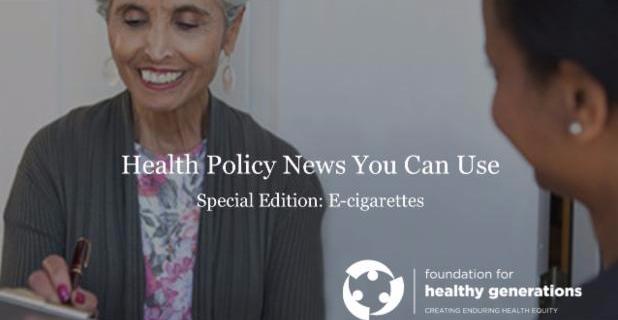
The e-cigarette epidemic has grown exponentially over the past few years and continues to present challenges to communities and public health officials. Calls to the Washington Poison Center have nearly doubled every single year since 2010 when the first e-cigarette poisonings were reported in this state.
E-cigarettes are not subject to federal regulations, nor are the liquids used in them. The FDA is currently considering rules to regulate the fledgling industry, while the industry innovates product at an astonishing speed, while research has shown the liquids contain a wide variance in nicotine content. Consumers who wish to use the devices for cessation may actually be using higher levels of nicotine then if they were smoking combustible cigarettes.
In the last 2 years, the Washington State Legislature has considered various policy options to deal with e-cigarettes without the passage of final legislation. The policy options on the table have included: taxation, retailer licensing, child-safe packaging, restricting the age of sale to those age 18+, requiring disclosure of nicotine content and toxic or carcinogenic chemicals in the liquids, prohibiting internet sales, etc. Meanwhile, local health departments are considering policy regulations through board of health ordinances, or are leading community conversations about the devices. However, the infancy of the health impact research complicates policy discussions.
Background
E-cigarettes, or vape pens, are increasingly popular products that deliver nicotine and other harmful ingredients to users and bystanders, yet no federal regulation of these products currently exist. The American Public Health Association has recommendedthat states and municipalities enact laws prohibiting the use of e-cigarettes in enclosed public areas and places of employment due to their potential as a source of pollutants. Recent research has suggested that contrary to some opinions, e-cigarettes may not be effective tobacco cessation aids and may even inhibit the ability to quit. In 2014 and 2015, 33 Attorneys General submitted letters urging the FDA to require warning labels and childproof packaging, as well as restricting advertising, prohibiting flavoring, and other restrictions. Although the FDA is considering warning label and childproof packaging regulations, there is still no way to verify ingredients or safety claims made by manufacturers.
Impacts on Children & Youth
The 2014 Healthy Youth Survey found that one in five high school seniors in Washington reported e-cigarette use, almost triple the amount reported in 2012. This dramatic increase indicates the growing social acceptance of e-cigarettes among teens, which threatens to undermine decades of anti-tobacco education and advocacy. This is worrisome for many reasons, including because nicotine is particularly harmful to brain development in children and adolescent smokers are more likely to continue into adulthood. There is also early evidence that teens who vape are more likely to take up traditional combustible cigarettes. Manufacturers of e-cigarettes are not subject to the same advertising rules as the tobacco industry and therefore can market their products using celebrity endorsements or cartoon characters that appeal to children. Vaping products are also available in candy-like flavors that are attractive to younger users.
E-liquid, the nicotine-containing component, presents a poisoning threat to children via ingestion, inhalation, and skin contact. Exposure to even tiny amounts of e-liquid can cause vomiting, seizures, and death. A CDC study found that the number of calls to poison centers related to e-cigarettes had increased from one per month in September 2010 to 215 per month in February 2014. More than half of these calls concerned children under the age of 5. In 2015, the Washington Poison Center has reported 58 e-cigarette poisoning exposures, including 40 pediatric cases. Eighty-five percent of these exposures concerned children between the ages of 1 and 3.
The use of e-cigarettes to consume marijuana and synthetic drugs is also a growing public health concern. A recent study of high school students in Connecticut found high rates of vaporizing marijuana. Because vaping can be almost completely odorless, users are able to smoke marijuana in public places without detection. Marijuana use on school property is of particular concern for this reason. E-cigarettes can also be used to vaporize highly dangerous drugs such as synthetic marijuana.
Regulatory Context
Only e-cigarettes that are marketed for therapeutic purposes are currently regulated by the Federal Drug Administration (FDA). The FDA has issued a proposed rule to extend the agency’s tobacco regulating authority to cover additional products including electronic cigarettes and others. This would bring e-cigarettes and like vaping devices under the same requirements of currently regulated tobacco products, including reporting product and ingredient listings; requiring health warnings; only making direct and implied claims of reduced risk if the FDA confirms scientific evidence in support of the claim; ban the distribution of free samples; and establish minimum age and identification restrictions. Still this would not halt online sales, ban vaping in public areas, or ban marketing of flavors appealing to youth and children. And until FDA rulemaking, which takes time based on the findings of longitudinal studies, States and Municipalities are left to come up with their own regulations.
E-cigarettes pose unique regulatory challenges to state and local authorities. In Washington, it is illegal to sell e-cigarettes or other vaping products to minors under the age of 18. However, because vaping products can be purchased online sales are difficult to monitor. Grant County, King County, Pierce County, Clark County, and the city of Pasco currently have ordinances in effect prohibiting the use of e-cigarettes in all areas where smoking is prohibited. Clark, King, and Pierce Counties also prohibit free sampling of vaping products. Grant County prohibits possession of any vaping product or device by anyone under the age of 18. King, Pierce, and Snohomish counties are currently considering new or revised e-cigarette ordinances.
The American Academy of Pediatrics just yesterday issued this statement: “The AAP now strongly recommends the minimum age to purchase tobacco products, including e-cigarettes, should be increased to age 21 nationwide.”
“Tobacco use continues to be a major health threat to children, adolescents and adults,” said Karen M. Wilson, MD, MPH, FAAP, chair of the AAP Section on Tobacco Control and section head of Pediatric Hospital Medicine at Children’s Hospital Colorado. “The developing brains of children and teens are particularly vulnerable to nicotine, which is why the growing popularity of e-cigarettes among adolescents is so alarming and dangerous to their long-term health.”
It seems to me, we may not know everything there is to know about e-cigarettes, but we know enough to adopt policies to protect children and adolescents.
Warmly,
Julie









